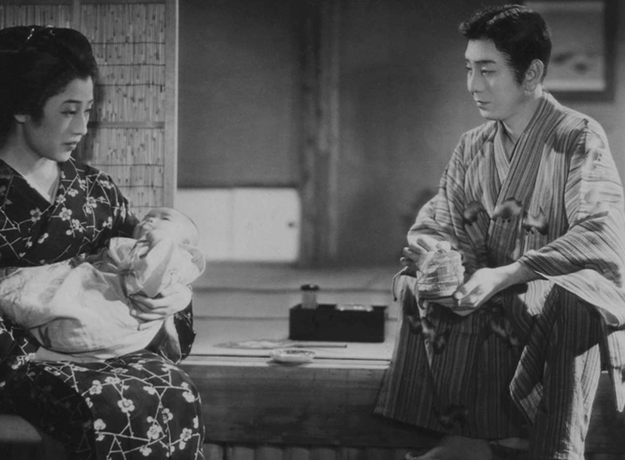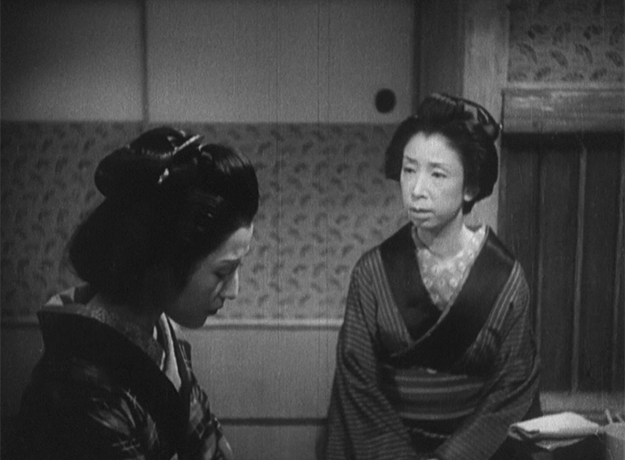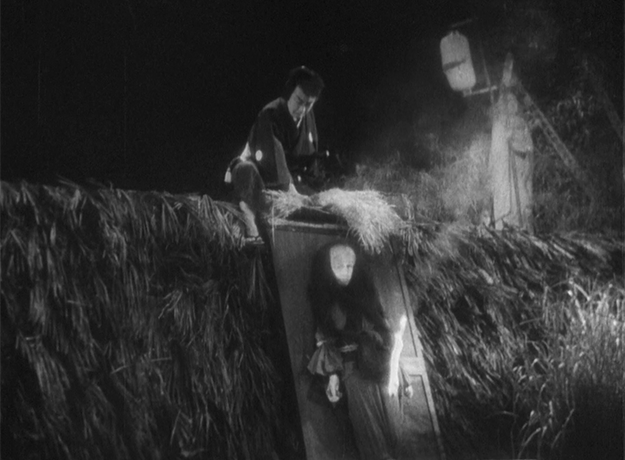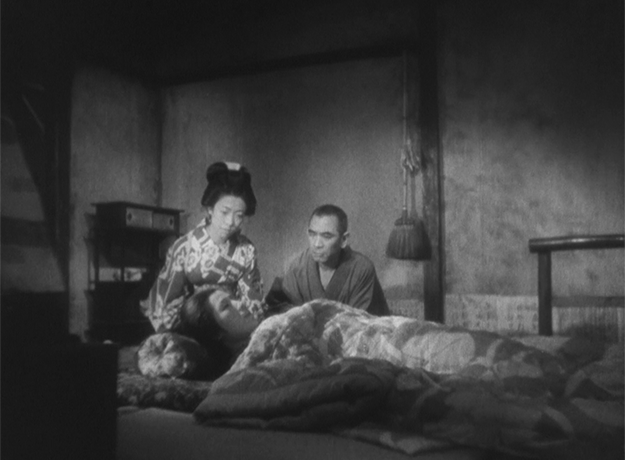Deep Focus: The Story of the Last Chrysanthemum

You can’t separate the turbulent beauty of Kenji Mizoguchi’s early masterwork, The Story of the Last Chrysanthemum (39), a Japanese classic now receiving its American theatrical premiere run, from its lacerating honesty. It’s an impassioned yet critical depiction of a woman sacrificing herself for her husband’s art and the man growing as an artist and a person—just not in time for them to share a happy life. Unlike Mizoguchi’s international hits, The Life of Oharu (52), Ugetsu (53), and Sansho the Bailiff (54), which unfold in medieval settings, this film takes place in the 1880s, in the bustling theater worlds of Tokyo and Osaka (as well as in some tawdry provinces). The director makes this milieu surprisingly accessible, imbuing it with the same psychological awareness and sensuality that illuminate and vitalize his famous feudal odysseys and folk tales. Mizoguchi balances the narrative between his late-blooming hero Kiku (Shotaro Hanayagi), the adopted heir to a reigning king of Kabuki, and Kiku’s common-law wife Otoku (Kakuko Mori), who starts the film as his infant brother’s nurse. The Story of the Last Chrysanthemum becomes an authentic dual tragedy. The movie has the shape of a Camille-like tearjerker, but it’s dramatically rigorous and tough-minded. Emotionally, it packs a one-two punch.
The film showcases Mizoguchi’s ability to sweep through masculine environments while lavishing attention on the females in his canvas. His Kabuki actors portray women as well as men and often parade across the stage in elaborate feminine kimonos, but their offstage behavior is formidably macho. Kiku’s Tokyo-based family is as patriarchal and rigid as any feudal clan. From the start, Kiku feels the oppressive weight of his adopted pedigree. Any acclaim he enjoyed as a fresh face has long faded. He’s become a wastrel as well as a terrible actor. But his father, Kikugoro Onoe V, has designated him “Kikugoro VI,” so their retinue and relatives, along with geishas and stage-door hangers-on, still coddle and flatter him. For this family, dignity and solidarity are paramount. Audiences and peers must not think that an artist as illustrious as Kikugoro V would suddenly criticize his adopted boy right after fathering a biological son.
Kiku is no artist (at least not yet), but he’s no dope either. He sees through the happy talk and yearns for straight talk. It makes sense that in this claustrophobic universe, the sole person who provides it would come from the nursery. Otoku, his baby brother’s nursemaid, tells him that he really is a rotten actor who lacks his father’s sense of calling. She has no qualification or desire to be his acting coach, and no creative ambition of her own. By bringing Kiku to his senses, she feels that she’s both helping him and protecting the honor of his family. When Kiku’s mother berates her as an upstart and a gold-digger, she simply says that she hopes to be “the nursemaid for his art.” Otoku’s own artlessness pierces Kiku to the core. Fearing scandal, his mother and father eject her from their household. They’re unfair but perceptive. Otoku is too sincere to hide the feelings Kiku stirs within her.

The movie is based on a play derived from a short novel, but the film feels like a filmmaker’s original take on the youth of Kikugoro VI, a real actor who lived for 10 years after the release of this movie. It vibrates with Mizoguchi’s tuning-fork sensibility. Earlier in his career, Mizoguchi had adapted Eugene O’Neill and Leo Tolstoy. This film trains a merciless intelligence on the volatility of men and women and the cruel grip of an idée fixe. Seeing Otoku as his lifeline, Kiku refuses to let go of her. He underestimates the power of family, turning his back on his home and legacy. Then he demands that Otoku accompany him to Osaka, where he plans to make a name for himself. Under pressure from his parents, her parents forbid it. By the time she catches up to Kiku a year later, he’s floundering once again, and they seem to have lost their golden moment. He guilt-trips her about delaying their “fresh start,” but Otoku still believes in him. Though he never legitimizes their relationship, she lives with him as his wife. She pawns her belongings to buy him whatever he needs to progress as an actor, like a dressing table with a mirror. Her sewing jobs pay for their food and rent. During four years on the road with a disreputable group of traveling players, she sticks by him through thick and thin—make that thin and thin.
Still, even when you’re appalled at his callous, selfish behavior, the movie is overwhelmingly romantic. It’s not about their degradation. It’s about her righteousness and his ultimate worthiness. When Kiku comes into his own as an actor, he becomes miraculously sane. He believes that he and Otoku can be joyous in their life and his art. By then, though, Otoku and the audience realize that it’s an impossible dream. Fate has rewritten the script—fate, and a society that offers few opportunities and no mercy for a modest woman who has lived with a man beyond her servile station.
Fearing that he will self-destruct if he fails, knowing that she’ll lose him forever if he succeeds, Otoku ushers him onstage, then moves from the wings to beneath the stage in order to pray for his triumph. Afterward, under the delusion that they will live happily ever after, Kiku suddenly acts like a real husband, whether by celebrating quietly with his wife or buying her sumptuous material for a homecoming kimono. Kiku protests to his colleagues that he cannot survive without Otoku. He says he won’t abandon his wife just when he can do something for her. They counter that he can satisfy her now only by furthering his career. In that time and in that place, this might be true.

No film has captured with more insight, pathos, and black comedy a devoted wife internalizing her husband’s creative conscience. When, strictly for money, Kiku accepts a place in a ragtag ensemble, Otoku is the one who keeps the faith. Rather than adore her for it, he abuses her and blames her for their sorry plight. Otoku remains generous and perceptive. Because the flowering of his genius is her unshakable goal, she shrugs off multiple humiliations. She can tell that Kiku’s disappointments, and even his bitterness and acrimony, fuel his development as an artist.
The Story of the Last Chrysanthemum heralds Mizoguchi’s Ugetsu in unpredictable ways. In that spectacular, fabulist movie, the potter who becomes an artist and the neighbor who becomes a samurai learn that their skill and ambition wreak havoc on their home lives. In The Story of the Last Chrysanthemum, Mizoguchi fleshes out that rift with a remarkable mingling of naturalism and theatricality. As Otoku, Mori is subtle, vibrant, and refreshingly un-actressy. Even under attack from Kiku’s mother, she’s upfront about everything, including what she sees as her own modest gifts. She underplays her psychological and artistic instincts. But her protectiveness toward her husband can be fierce, and her determination to see him bloom enables her to be cagy, especially toward him. When she feels her work is done, she collapses into heartbreaking, terrifying weariness. A friend tells her that she has changed completely. Mori makes you feel this alteration to the marrow: you mourn the loss of her stripped-wire sensitivity.
Without a touch of vanity, Hanayagi, as Kiku, depicts an overgrown boy belatedly maturing. As a drifting playboy he’s just a husk of a man, until he thanks Otoku for telling him the truth. Then he beams with rapture and appreciation. He’s touching when he walks to the Osaka railroad, constantly looking sideways to see whether she makes it to the station. He’s infuriating near the end of four years on the road, when he demands beer money from Otoku, who’s been saving to buy him underwear. But as a stylized stage performer, he has become amazing to watch. In the film’s opening stage scene, he merely strikes simpy poses. Five years (and 90 minutes) later, during Kiku’s life-changing performance, his stylization is electric: he portrays a woman of intrigue with indelible precision. Kiku’s oversized kimono seems to drag his character this way and that while his/her face fills with resistance and regret. Hanayagi’s performance builds on that accomplishment. He persuasively dramatizes Kiku becoming a new person on stage and off, dedicated to his craft and ardently devoted to Otoku. His final deepening comes with bottomless sorrow.

Mizoguchi’s moviemaking is dizzyingly expressive. He directs Kabuki for galvanizing effects, using the long narrow ribbon of the stage as if it were theatrical CinemaScope, putting over the epic feelings of imposing, ritualistic characters. Even offstage his choices seem to expand the squarish frame of his 1.37:1 screen, whether with a long traveling shot tilted upward, of the lovers’ first heart-to-heart talk (the angle itself feels incipient), or with a downturned shot that takes in the open sleeping quarters of a fleabag hostel, as if from the perspective of a depressed angel. This director is a poet of space. You share Otoku’s chagrin over Kiku’s tiny Osaka apartment after getting to know Kikugoro V’s airy Tokyo compound.
Mizoguchi’s harmonious yet unexpected compositions, his andante tempo and long takes, and his pellucid blocking produce sequences that resonate throughout the movie, often with material as mundane as the slicing of a watermelon. The film is more than the sum of its virtuoso sequences. Along with Kiku, the audience learns about the wages of artistic sin and the need to approach life and theater with humility. “Read all the Russians, and then reread them,” goes a line in Jhumpa Lahiri’s novel, The Namesake. “They will never fail you.” After seeing a film by Kurosawa or Mizoguchi, that’s how I feel about the great Japanese directors. They make most other filmmakers come off as magicians or children.







